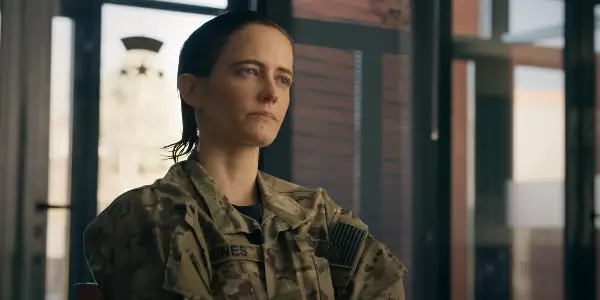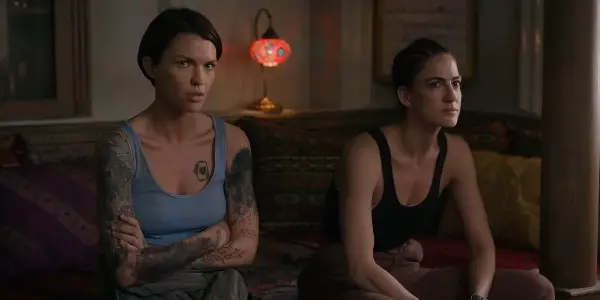DIRTY ANGELS: The Most Boring Afghanistan War Film You’ll Ever See
Film critic, Ithaca College and University of St Andrews graduate,…
Martin Campbell’s name used to mean something in this town. The Dirty Angels director singlehandedly breathed life back into the James Bond franchise with GoldenEye way back in 1995 and did it again with Casino Royale in 2006. Maybe those Bond movies went to his head, though — maybe his brain was turned to mush from doing so many pulpy “geopolitical thrillers” that can really be reduced to a white British guy gunning down en masse people who don’t speak English and who usually have Eastern European accents. Those movies are relics of a world that was always just a fantasy, but which feels even more foreign now, when wars in Ukraine and Gaza are so highly publicized and geopolitical complexities are less abstract.
Dirty Angels is the latest of Campbell’s geopolitical action movies, though it’s more in the vein of his 2003 relief worker drama Beyond Borders than his James Bond works. The film begins with a group of Afghan girls taken hostage by the Islamic State, and Eva Green plays the loose cannon who doesn’t play by the rules who has to go into Afghanistan to get those girls back. She and her fellow operatives pose as relief workers, the rationale being that they can hide under niqabs and blend in easily. If the film committed to that premise, it would be at least a little interesting, but we see so little of the relief organization aspect that it feels like a completely unnecessary detail for an otherwise straightforward shoot-em-up movie. It is the flimsiest of premises and feels reverse-engineered so we can get to the shooting as quickly as possible.
Girl Power Versus the Islamic State
The elevator pitch of Dirty Angels hinges heavily on its core all-women team going up against ISIS, and the film’s strongest and weakest traits are that it doesn’t draw attention to the feminist angle. There are some pretty obvious themes about gender in Afghanistan and within radical Islam that go completely unexplored. As nice as it is to not feel pandered to with some #girlpower filmmaking, it would be nicer if these people felt like characters and not just walking turrets. (There are four credited screenwriters on this dud.)
John Wick: Chapter 2 star Ruby Rose, Oscar nominee Maria Bakalova, and Israeli actress Rona-Lee Shimon are each excellent, capable performers, but they have nothing to do here besides pose and banter and wait to be swapped out for their stunt doubles. The other women in the group — played by Emily Bruni, Jojo T. Gibbs, and Laëtitia Eïdo — unfortunately do not get many opportunities to shine either. The best performances in Dirty Angels come from the actors playing the Afghans — Reza Brojerdi and Aziz Çapkurt bring warmth and humor to the otherwise oppressively boring team. Notably, neither actor is Afghan; Brojerdi is Iranian-German, and Çapkurt is Turkish, which is the sort of geographic fluidity you’d expect from a movie that substitutes Morocco and Greece for Afghanistan and never once actually shot in that country. At this point, I believe the war in Afghanistan was a conspiracy by Morocco and the state of New Mexico so that they could play Afghanistan in every modern American war film made since 2001.

Eva Green plays her special forces character, meanwhile, as a stubborn brick wall perpetually staring into the middle distance. Her terribly throaty voice and inability to connect with other people are all we have to grab onto — otherwise, her character could be replaced with one of those Boston Dynamics AI dogs with an M16 screwed onto its back and the plot would be no different. After playing one of the more thinly written Bond women in Casino Royale, one would hope that Campbell could give her a more lively, interesting role, but Dirty Angels unfortunately isn’t even worth watching for Eva Green. Her performance is necessarily stilted and static, since she’s just a killing machine within a story that doesn’t let her be anything else. Additionally, her character’s pseudonym for the mission is “Jessica Rabit,” with one “b,” which is the dumbest fucking thing ever, but I also totally understand why it’s in the script: These people have to talk about something. Otherwise, it’d be just 104 minutes of grunts, eyebrow cocks, and contemplative drags of cigarettes.
Once you hear some of the horrid dialogue these women say to one another, though, you’ll wish the whole movie were silent. It’s all gruff talk about the horrors of war, the morality of killing people, and the importance of the mission, and every line feels as though it’s tailor-made for the trailer and written by someone who’s never even been in so much as a schoolyard fight. The rest of the dialogue is ham-fisted exposition meant to tell us who’s betraying whom and which terrorists the heroes are gunning down now.
The Action Looks Better in the Wide Shots
Martin Campbell once directed a movie in which Sean Bean falls a mile down onto concrete and screams as he’s crushed by a massive satellite. In the same movie, a dominatrix henchwoman is crushed to death against a tree and Pierce Brosnan says a goofy, wildly psychopathic one-liner. Later, Campbell made the first and, to date, only James Bond picture in which the hero canonically gets his testicles whipped by the main villain. The point is, Campbell used to make interesting movies with interesting fight scenes, directed in a way that’s pulpy enough to satisfy the most bloodthirsty audiences but sly enough to let them in one the joke. And when he abandoned the tongue-in-cheek tone for the stoic realism of Casino Royale, he never lost that ability to compellingly direct character-focused action sequences. Watching Dirty Angels, I wondered, what the hell happened? Did he outsource half the movie to his second unit?

The best I can say about the action direction in Dirty Angels is that it looks better in the wide shots. The explosions, volleys of gunfire, and bloody machete fights play better the farther we are from the characters, when we can’t tell who’s a stunt person and who isn’t. At the film’s best, Campbell’s style feels like that of a VOD action movie veteran like James Nunn. Fistfights are appropriately intense and decently choreographed — fight coordinator Cali Nelle previously worked on Black Widow and Gladiator II and was Wesley Snipes’ stunt double in Deadpool & Wolverine — and the wire work all around is good. Sometimes, well-choreographed action is its own reward, and if that’s all you want from a film (with a bonus of girlboss defense contractor), Dirty Angels will satisfy you.
But even the action in Dirty Angels is far from perfect. Like the VOD action movies it emulates, Dirty Angels is blunt, has some good Steadicam work, and never skimps on the money shots (of cars exploding or dudes getting shot in the head), but the movie always looks cheap. And a bevy of small details totally undermine the movie, like the fact that every shot is a headshot, that not everybody is wearing bulletproof vests all the time (probably because everyone aims for the head!), and that nobody’s guns seem to have any recoil. There are way too many military nerds who will watch this and lose their minds over those small but glaring errors, and frankly I’m on their side this time.
Conclusion
Maybe writing this out will make me seem like a huge dumbass, but I don’t think Dirty Angels has anything to say about the war in Afghanistan. It’s totally uncritical of the military and doesn’t engage at all with Islamist ideology — what’s the point of such a basic-ass war movie that doesn’t ask hard questions? These women recoil when they see a friend’s throat slit on live television, yet they slit throats left and right and stab insurgents in the head, and the film isn’t smart enough to reckon with that.
Over 20 years after the invasion of Afghanistan, you would think that the movies about it have more to say than this. Dirty Angels is boring slop that at least has some good action direction. But good action direction can only save a movie if it has Scott Adkins smashing people in the face with a baseball bat. In a geopolitical thriller, you would hope the movie is more than a stale, trigger-happy mess with ugly army crate font for the end credits.
Dirty Angels is now playing in cinemas and available to rent online.
Does content like this matter to you?
Become a Member and support film journalism. Unlock access to all of Film Inquiry`s great articles. Join a community of like-minded readers who are passionate about cinema - get access to our private members Network, give back to independent filmmakers, and more.
Film critic, Ithaca College and University of St Andrews graduate, head of the "Paddington 2" fan club.










